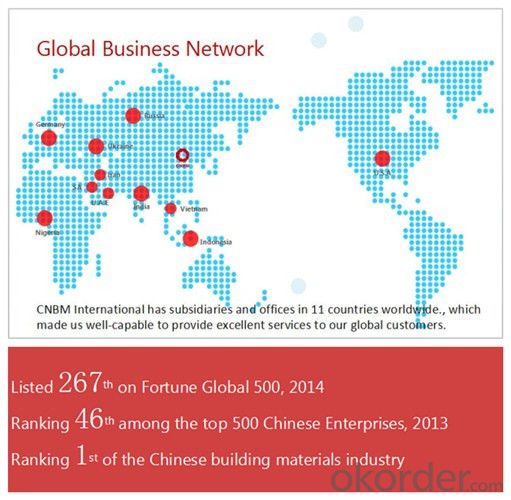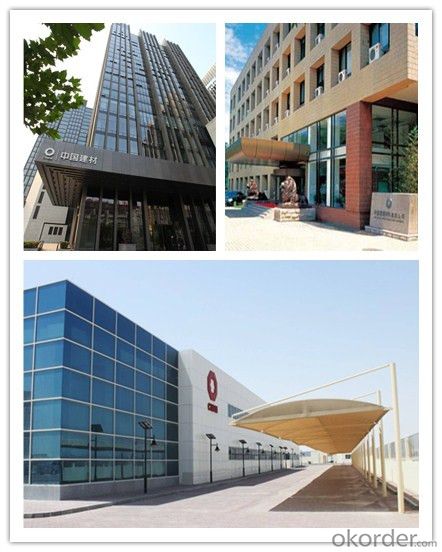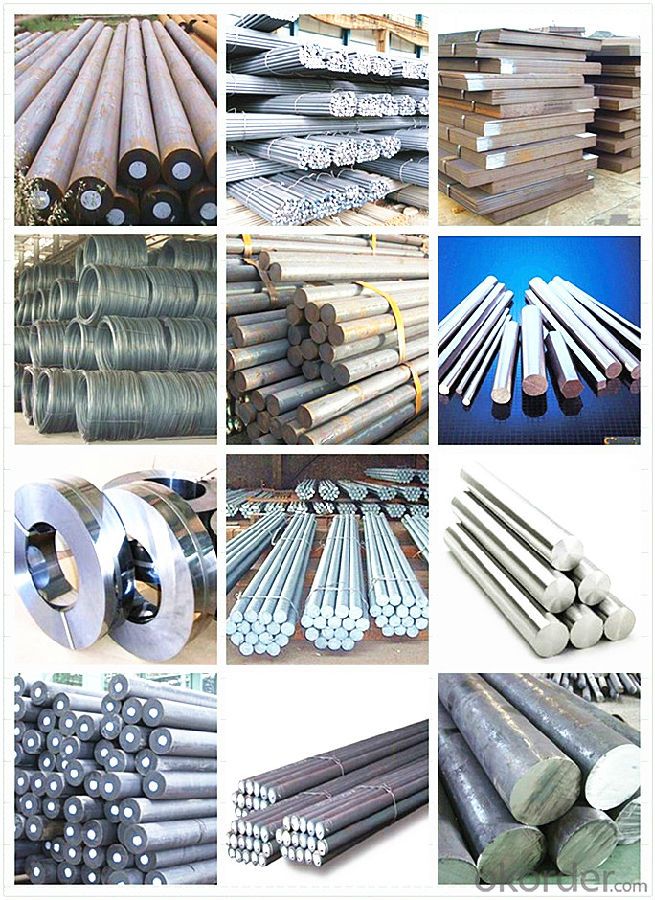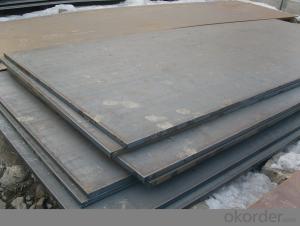Grade 65Mn Ship Plate Coil Hot Rolled Steel
- Loading Port:
- Tianjin
- Payment Terms:
- TT OR LC
- Min Order Qty:
- 3 m.t.
- Supply Capability:
- 100000 m.t./month
OKorder Service Pledge
OKorder Financial Service
You Might Also Like
Item specifice
Grade 65Mn Ship Plate Coil Hot Rolled Steel
Detailed Information of Grade 65Mn Ship Plate Coil Hot Rolled Steel
| C | Si | P | S | yield Strength MAp | Tensile strength MAp | Elongation % | ||
| A36 | 0.24 | 0.4 | 0.045 | 0.03 | 250 | 400-520 | 26 | |
| C | Si | Mn | P | S | Cu | |||
| A283 | ≤0.27 | 0.15-0.4 | ≤0.9 | ≤0.035 | ≤0.04 | ≥0.2 | ||
| Thickness: | 6mm, 8mm, 12mm, 16mm, 20mm, 25mm, 30mm, 50mm, 80mm, 100mm, 150mm, 200mm | |||||||
| Width: | 1500mm, 1800mm, 2000mm, 2200mm, 2500mm | |||||||
| Length: | 6000mm, 8000m, can cut to width and length | |||||||
| Packing Details; | according to customer‘s require or export’s standard | |||||||
| Delivery time; | 7 days for stock sizes, 20-25 days for new production sizes | |||||||
| Port: | Tianjin China | |||||||
Related Products Overviews of Grade 65Mn Ship Plate Coil Hot Rolled Steel
Product Name | Typical Grades | Diameter(mm) | Standard Adopted |
Carbon Steel | 20 (1020/S20C/C22) |
Ø16-Ø300 |
GB/SAE/ JIS/DIN |
40 (1040/S40C/C40) | |||
45 (1045/S45C/C45) | |||
Bearing Steel | GCr9 (51100/SUJ1) |
Ø12-Ø250 | |
GCr15 (52100/SUJ2/100Gr6) | |||
GCr9SiMn (A485-Gr.1/SUJ3) | |||
Cr-Mo Steel | 20Cr (5120/SCr420H/20Cr4) |
Ø12-Ø250 | |
40Cr (5140/SCr440/41Cr4) | |||
42CrMo(4140/SCM440/42CrMo4) | |||
Gear Steel | 20CrNiMo |
Ø16-Ø600 | |
20CrMn(5115/SMnC420/20MnCr5) | |||
20CrNiMo(8620/SNCM220/20CrMiMo2) |
Related Products Application of Grade 65Mn Ship Plate Coil Hot Rolled Steel
Carbon Steel | l Mold bottom l Plastic mold l Construction machinery parts l Automobile parts l Security grills l Screens l Construction |
Bearing Steel | l Aerospace l Navigation l Nuclear energy l Chemical industry l Electronic information l Petrochemical l Instrument and meter l Transportation |
Cr-Mo Steel | l Mechanism & Fasteners gear l Stressed components for vehicles l Engines and machines l Parts of larger cross-section |
Gear Steel | l All kinds of gears l Statically and dynamically stressed component for vehicles l Engines and machine l Larger cross-section parts l Crankshafts |
Company Introduction of Grade 65Mn Ship Plate Coil Hot Rolled Steel
CNBM International Corporation is the most import and export platform of CNBM group(China National Building Material Group Corporation) ,which is a state-owned enterprise, ranked in 270th of Fortune Global 500 in 2015.
With its advantages, CNBM International are mainly concentrate on Cement, Glass, Iron and Steel, Ceramics industries and devotes herself for supplying high quality series of refractories as well as technical consultancies and logistics solution.


After-sale service | l CNBM provides the services and support you need for every step of our cooperation. We’re the business partners you can trust; you can relax and get on with doing business. l For any problem, please kindly contact us at any your convenient time, we’ll reply you in our first priority within 24 hours
|
Advantages
| l Industry experience over 20 years. l Shipment of goods -More than 70 countries worldwide. l The most convenient transport and prompt delivery. l Competitive price with best service. l High technical production line with top quality products. l High reputation based on best quality products.
|
Packaging & Delivery of Grade 65Mn Ship Plate Coil Hot Rolled Steel
Packaging Detail | Sea worthy packing /as per customer's packing instruction |
Delivery Detail | 15 ~ 40 days after receiving the deposit |
Products Show

FAQ:
Are you a trading company or manufacturer? | Manufacturer |
What’s the MOQ? | 3 metric ton |
What’s your delivery time? | 15-35 days after downpayment received |
Do you Accept OEM service? | Yes |
what’s your delivery terms? | FOB/CFR/CIF |
What's the Payment Terms? | 30% as deposit,70% before shipment by T/T |
Western Union acceptable for small amount. | |
L/C acceptable for large amount. | |
Scrow ,Paybal,Alipay are also ok | |
Why choose us? | Chose happens because of quality, then price, We can give you both. Additionally, we can also offer professional products inquiry, products knowledge train (for agents), smooth goods delivery, excellent customer solution proposals. |
What's your available port of Shipment? | Main Port, China |
What’s your featured services? | Our service formula: good quality+ good price+ good service=customer's trust
|
Where are your Market? | Covering more than 160 countries in the world |
- Q:What are the different methods of surface etching for special steel?
- Special steel can be surface etched using various methods. These methods include the following: 1. Chemical etching: This technique involves selectively removing material from the steel surface using different acids or chemical solutions. It allows for precise control and can create intricate patterns or designs. 2. Electrochemical etching: By using an electrical current, the steel surface is etched. This method is effective for creating uniform and deep etches, often used for labeling or marking purposes. 3. Laser etching: A high-powered laser is utilized to remove material from the steel surface. This method is known for its precision and ability to create detailed designs or markings, commonly used for branding or decorative purposes. 4. Mechanical etching: Physical abrasion is employed to remove material from the steel surface. This can be done manually with tools like sandpaper or brushes, or with the help of machinery like a sandblaster. Mechanical etching is often used to create a textured or roughened surface. 5. Plasma etching: High-energy plasma is used to remove material from the steel surface. This method is useful for creating fine and shallow etches, commonly employed in microfabrication or semiconductor manufacturing. Each method has its own advantages and limitations. The choice of which method to use depends on factors such as the desired outcome, the specific type of special steel being etched, and the available equipment and resources.
- Q:How does special steel contribute to the medical aftermarket industry?
- Special steel plays a crucial role in the medical aftermarket industry by providing high-quality materials necessary for manufacturing medical devices and equipment. Special steel, also known as stainless steel, offers numerous advantages that make it ideal for medical applications. First and foremost, special steel is highly resistant to corrosion and rust, which is essential in the medical field where hygiene and cleanliness are of utmost importance. Medical devices like surgical instruments, implants, and equipment need to be sterilized frequently, and the corrosion resistance of special steel ensures their durability and longevity. Additionally, special steel possesses excellent strength and hardness properties, making it suitable for medical implants and prosthetics. These implants must be strong enough to endure the stresses and strains of the human body while maintaining their structural integrity. Special steel provides the necessary strength and toughness required for these critical applications. Furthermore, special steel is biocompatible, meaning it does not cause any adverse reactions or toxicity when in contact with living tissues. This property is essential for implants and devices that come into direct contact with the human body, as it minimizes the risk of rejection or allergic reactions. Moreover, special steel's versatility allows it to be easily machined and fabricated into complex shapes and sizes, meeting the diverse requirements of medical applications. It can be formed into delicate surgical instruments, precision cutting tools, and even large-scale equipment such as hospital beds and imaging machines. The high precision and dimensional stability of special steel contribute to the accuracy and reliability of medical devices. This is especially crucial in areas like diagnostics and imaging, where precise measurements and high-quality images are vital for accurate diagnosis and treatment planning. In conclusion, special steel's corrosion resistance, strength, biocompatibility, and versatility make it an invaluable material in the medical aftermarket industry. Its use in manufacturing medical devices and equipment ensures the highest standards of hygiene, durability, and performance, ultimately contributing to the advancement of healthcare and improving patient outcomes.
- Q:What are the characteristics of tool steel?
- Tool steel is a type of high-carbon steel that possesses exceptional hardness, durability, and resistance to wear and deformation. It is specifically designed to be used in various cutting, shaping, and forming tools. Some common characteristics of tool steel include high strength, excellent heat resistance, good toughness, and the ability to hold a sharp edge even under extreme conditions. Additionally, tool steel often has good machinability and can be easily heat treated to enhance its properties for specific applications.
- Q:How does special steel contribute to the automotive fuel efficiency?
- Special steel contributes to automotive fuel efficiency in several ways. Firstly, special steel is often used in the construction of lighter and stronger components such as the chassis, body panels, and engine parts. This reduces the overall weight of the vehicle, leading to improved fuel economy. Secondly, special steel can be used in the manufacturing of components like exhaust systems, which are designed to reduce emissions and improve fuel efficiency. Additionally, special steel can also be utilized in the production of more efficient engine designs, such as turbochargers, which enhance the power output while minimizing fuel consumption. Overall, the use of special steel in the automotive industry plays a crucial role in enhancing fuel efficiency and reducing environmental impact.
- Q:How does stainless steel contribute to the construction industry?
- Stainless steel contributes to the construction industry by offering durability, strength, and resistance to corrosion, making it an ideal material for various applications such as structural supports, roofing, cladding, and reinforcement. Its versatility, aesthetic appeal, and low maintenance requirements make it a popular choice for architects, engineers, and builders. Additionally, stainless steel's recyclability and sustainability aspects further enhance its contribution to the construction industry.
- Q:How does special steel perform in high-temperature strength?
- Special steel, also known as high-temperature steel, is specifically designed to excel in high-temperature strength applications. Unlike standard steels, which may lose their strength and structural integrity at elevated temperatures, special steel retains its mechanical properties even under extreme heat conditions. One of the key reasons behind the exceptional high-temperature strength of special steel is its unique composition. It is typically alloyed with elements such as chromium, nickel, and molybdenum, which significantly enhance its resistance to the effects of thermal expansion, oxidation, and creep. These alloying elements form stable oxides on the surface of the steel, acting as a protective layer that prevents further oxidation and corrosion, thereby maintaining the material's strength and integrity. Moreover, the microstructure of special steel plays a crucial role in its high-temperature performance. Through advanced manufacturing techniques, special steel is engineered to have a fine-grained structure, which improves its resistance to deformation and improves its creep strength. The fine grains also contribute to its ability to retain its mechanical properties at elevated temperatures for prolonged periods. Additionally, special steel undergoes rigorous heat treatment processes, such as quenching and tempering, which further enhance its high-temperature strength. These processes help to refine the microstructure and optimize the mechanical properties of the steel, including its hardness, toughness, and resistance to thermal fatigue. In conclusion, special steel is specifically designed and engineered to excel in high-temperature strength applications. Its unique composition, microstructure, and heat treatment processes contribute to its exceptional resistance to thermal expansion, oxidation, and creep, ensuring that it retains its mechanical properties and structural integrity even under extreme heat conditions.
- Q:How are aluminum alloys used in the automotive industry?
- Aluminum alloys are extensively used in the automotive industry due to their lightweight, high strength, and corrosion-resistant properties. These alloys are commonly utilized in the manufacturing of various components, such as engine blocks, cylinder heads, wheels, and body panels. By incorporating aluminum alloys, vehicles can achieve improved fuel efficiency, better performance, and enhanced safety while reducing overall weight and emissions.
- Q:What are the main applications of special steel in the food processing machinery?
- Special steel is commonly used in food processing machinery due to its unique properties and benefits. The main applications of special steel in food processing machinery include ensuring hygiene and cleanliness, resistance to corrosion and wear, high strength and durability, and compatibility with food safety regulations.
- Q:How does special steel perform in case hardening applications?
- Special steel performs exceptionally well in case hardening applications. Case hardening is a heat treatment process used to increase the surface hardness of a material while maintaining a tough and ductile core. Special steel, also known as alloy steel, is specifically formulated to have enhanced properties such as high strength, toughness, and wear resistance. In case hardening applications, special steel is ideal due to its ability to form a hard outer layer while retaining its core properties. The process typically involves heating the steel to a specific temperature and then introducing a carbon-rich environment, such as through carburizing or carbonitriding. The carbon atoms diffuse into the steel's surface, creating a high-carbon layer, known as the case, which significantly increases hardness and wear resistance. Special steel's high carbon content allows for deeper and more uniform case hardening compared to other types of steel. This results in improved durability, reduced friction, and enhanced resistance to wear, abrasion, and impact. The tough core of special steel also ensures that the material remains resistant to cracking or fracturing under high stress or impact loads. Additionally, special steel offers excellent machinability, allowing for ease of processing during case hardening applications. This makes it a preferred choice for various industries, including automotive, aerospace, tooling, and manufacturing, where components require both high surface hardness and structural integrity. Overall, special steel is highly regarded for its exceptional performance in case hardening applications. Its combination of high strength, toughness, wear resistance, and machinability makes it an excellent choice for producing durable and reliable components that can withstand demanding operating conditions.
- Q:How does special steel contribute to improving product quality?
- Special steel contributes to improving product quality in several ways. Firstly, special steel has superior strength and durability compared to ordinary steel, making it less likely to deform or break under stress. This ensures that products made with special steel have a longer lifespan and are more reliable for consumers. Secondly, special steel can be engineered with specific properties such as corrosion resistance, heat resistance, or high hardness, which are essential for certain industries or applications. This allows manufacturers to create products that can withstand harsh environments or demanding conditions, ultimately enhancing product quality. Lastly, special steel can be precision-machined to tight tolerances, enabling the production of complex and intricate components with high precision. This level of accuracy results in better-fitting parts, improved performance, and enhanced overall product quality.
1. Manufacturer Overview |
|
|---|---|
| Location | |
| Year Established | |
| Annual Output Value | |
| Main Markets | |
| Company Certifications | |
2. Manufacturer Certificates |
|
|---|---|
| a) Certification Name | |
| Range | |
| Reference | |
| Validity Period | |
3. Manufacturer Capability |
|
|---|---|
| a)Trade Capacity | |
| Nearest Port | |
| Export Percentage | |
| No.of Employees in Trade Department | |
| Language Spoken: | |
| b)Factory Information | |
| Factory Size: | |
| No. of Production Lines | |
| Contract Manufacturing | |
| Product Price Range | |
Send your message to us
Grade 65Mn Ship Plate Coil Hot Rolled Steel
- Loading Port:
- Tianjin
- Payment Terms:
- TT OR LC
- Min Order Qty:
- 3 m.t.
- Supply Capability:
- 100000 m.t./month
OKorder Service Pledge
OKorder Financial Service
Similar products
New products
Hot products
Related keywords

































